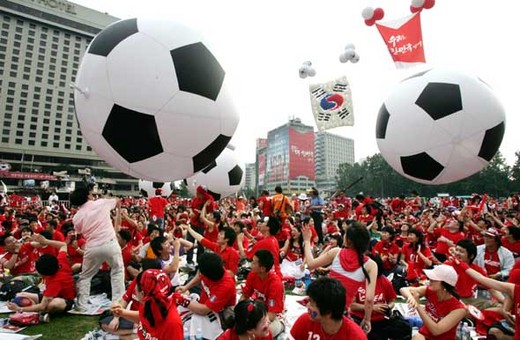Posted on : Jun.13,2006 17:09 KST
Modified on : Jun.13,2006 17:54 KST
Tuesday will see Korea’s first game in this year’s World Cup, with little else scheduled for regular television broadcasting. At the "big three" broadcasting companies, it is as if shows that are not about football have been squeezed in between merely for the sake of appearances. The one-track programming is really excessive, even considering that this is Korea’s first match in the games, and everyone is interested. At this rate, even viewers who really like football are going to get sick of it.
And so we feel forced to seriously ask broadcasting company executives whether they think this is okay to do to their viewers. If they cannot answer with confidence, the right thing for them to do is change their program schedules immediately. Even private broadcasting has no right to disrespect viewers to this extent, let alone public broadcasting. The desire of those who would like to see other programming must be respected. Officials must not forget that the airwaves are public property and that broadcasting companies are only borrowing that medium. If companies do not correct the situation by themselves, the Korean Broadcasting Commission should get involved. It has a responsibility to block senseless broadcasting schedules.
It is not that we do not appreciate the fact that many people around the country, for whom life has been less than enjoyable lately, are enjoying the thought of Korea’s team putting on a good fight. However, no one is foolish enough to think the country’s destiny depends on a football game. We certainly hope to see Korea’s team members play their best, and while they’re at it, we hope they win. That is all there is to say. Television stations, however, are treating viewers like fools. Acting as if the whole country’s fate depends on beating Togo proves that televisions really are "fool’s boxes." (In Korean, televisions are sometimes referred to as "babo sangja," or "fool’s box.")
It would be unreasonable to demand networks to immediately come up with programs that are highly critical of a phenomenon in which major issues of national importance are being forgotten in the excitement over the World Cup. To some degree, they have no choice but to follow along, when society is so interested in what will happen. One can somewhat understand their need to reap what can be gained from the hype surrounding the event. Still, there need to be reasonable limits. Excessive World Cup programming takes away the fun--even from viewers who want to see the games--and that is something broadcasting companies should avoid, for the sake of their own long-term interest. We truly hope to see them return to reason.

